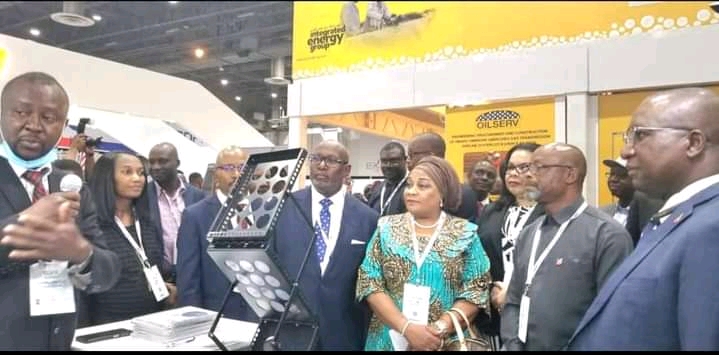Agriculture
NITDA, Mara To Train 500,000 On Blockchain Tech

Blockchain-based technology firm, Mara, has partnered the National Information Technology Development Agency (NITDA) and Circle to train 500,000 government employees on the intricacies of blockchain technology.
Circle is the creator of USDC and Euro Coin.
Mara is driving this initiative through its foundation, Mara Foundation. The collaboration seeks to equip Nigeria’s workforce with the skills and knowledge necessary to energise the workforce, drive innovation and foster economic growth in the digital age.
The first training session, which took place early this month, marked a significant milestone in this collaborative effort.
Managers from the NITDA participated in the session, which focused on the role of blockchain technology in building Nigeria’s digital economy.
Various topics were covered, including “The Role of the Blockchain Industry in Strengthening Nigeria’s Digital Economy” and “Policymaking and Regulations for the Blockchain Industry”.
Deputy Manager, Software Unit, IT Infrastructure Solutions Department at NITDA, Aishatu Yahaya Umar, expressed gratitude for the training.
She commended Mara for sharing valuable knowledge that will empower NITDA to explore the potential of blockchain in organisational processes, projects, and regulatory frameworks.
Ms. Umar acknowledged Mara’s dedication and collaborative efforts with the government and other stakeholders to drive blockchain technology in Nigeria.
“Mara, as one of the blockchain stakeholders in Nigeria, through this initiative has proven to be a great supporter of driving the Nigeria digital economy agenda and we at NITDA are excited to be partners and beneficiaries of their laudable initiatives.
“We are convinced that by collaborating with government and other stakeholders within the space, the full adoption of blockchain technology in Nigeria is not far-fetched”, she said.
Co-founder and CEO of Mara, Chi Nnadi, stated the organization’s commitment to closely work with the Federal Government to increase blockchain adoption across the country and the wider African continent.
“Mr. Nnadi expressed belief that empowering Nigeria’s workforce with the skills and knowledge required in the digital age would stimulate innovation and economic growth.
“Recognising blockchain’s transformative potential in various sectors, Mr. Nnadi emphasized the importance of equipping government workers with this technology to build a more effective and inclusive government system, as well as to establish better regulations.
technology in Nigeria.
“By training 500,000 government employees, the initiative seeks to propel Nigeria into a leading position in the digital economy and inspire other African nations to follow suit.
Agriculture
FG, Ogun Distribute Inputs To 2,400 Farmers
Federal Government and the Ogun State Government, on Wednesday, distributed farm inputs to farmers as part of effort to address food security challenge.
The State Director, Federal Ministry of Agriculture and Food Security, Dr. Toyin Ayo-Ajayi, during the flag-off ceremony of Inputs Redemption Under The National Agricultural Growth Scheme-Agro Pocket (NAGS-AP), in Ogun State, disclosed that beneficiaries of the gesture were primarily rice, maize and cassava farmers across the State.
Ayo-Ajayi commended the Ogun State Government for partnering with the government at the centre for the effort in supporting farmers with inputs that would bring about yieldings for local consumption and likely exportation.
She noted that government is supporting rice, cassava and maize farmers with inputs worth N212,000; N189,000 and N186,000 respectively.
The Permanent Secretary in the State Ministry of Agriculture, Mrs Kehinde Jokotoye, who represented the Commissioner in the Ministry, Bolu Owotomo, stated that traditional farmers are critical in food production, hence the need to encourage and support them with inputs that would bring about desired results during harvesting.
Owotomo said: “Let us make good use of this opportunity, so that the success of this phase will make farmers benefit more from the state and federal governments of Nigeria.”
Earlier, State Coordinator, Federal Ministry of Agriculture and Food Security, Dr. Oluwatoyin Ayo-Ajayi, appreciated the present administration for partnering with the federal government for the initiative, adding that the programme is designed to support farmers at the grassroots level in cassava, rice and maize with inputs such as, seeds, pesticides, herbicides and fertilizers, to boost their production and enhance their livelihood.
Agriculture
Niger Allocates 10,000 Hectares For Smallholder Farmers
The Niger State Government has mapped out 10,000 hectares of farmland in Gbapo Community of Katcha Local Government Area of the State for smallholder farmers to benefit from the state government’s agricultural intervention programme.
Two thousand out of the 10,000 holders of the farmlands have already received inputs.
At a flag-off ceremony in Yinti Village, the facilitator of the programme, Shinkafan Nupe, Malam Idris Usman Makanta, assured the farmers of increased distributions to the mapped-out ten thousand (10,000) farmlands if farmers respond positively.
He explained that the commencement of the two thousand is to measure the positive response of farmers before obtaining full-scale support.
Malam Makanta stated that this initiative aligns with the farmers’ initial commitment through Niger Foods, whose mission is primarily geared towards establishing efficient and profitable agricultural businesses to support the present administration of Governor Mohammed Umaru Bago’s quest to boost agricultural productivity in the state.
He also commended Niger Foods for their steadfastness and resilience in the effective implementation of the input financing scheme.
Makanta reiterated the commitment of the State Governor in making judicious use of the arable land in the state.
Shinkafan Nupe, therefore, urged the farmers to support the Governor by using the inputs wisely so that the dream can be actualised.
Agriculture
GO-CARES: Gombe Empowers 573,429 Farmers, Entrepreneurs
The Gombe State Government has empowered a total of 573,429 farmers and entrepreneurs under the 4th phase of the GO-CARES programme.
The programme was officially flagged off by Governor Inuwa Yahaya in another major step towards alleviating poverty and supporting the state’s vulnerable populations.
The Governor, while inaugurating the disbursement in Akko Community of Akko Local Government Area, restated his administration’s commitment to the welfare of vulnerable citizens in the state.
He was represented by the Commissioner for Budget and Economic Planning, Salihu Baba Alkali, who is also the Chairman of the Steering Committee on GO- CARES implementation.
“The 4th phase of GO-CARES will directly and indirectly impact a total of 573,429 citizens across the state. Of these, 152,429 individuals will benefit directly through cash transfers, livelihood grants, agricultural inputs, and operational grants to small businesses”, he stated.
The Governor added that, “421,000 people will be indirect beneficiaries through infrastructural projects such as classroom blocks, healthcare facilities, WASH services, and rural infrastructure projects like culverts and drainages”.
Yahaya, reaffirmed his commitment to ensuring that the state’s most vulnerable citizens are not left behind in the state’s development.
According to him, “Earlier this year, on June 25, 2024, we flagged off the distribution of improved seedlings, fertilizers, and herbicides to less privileged farmers in Malam Sidi, Kwami Local Government Area, signaling the commencement of the 4th phase implementation of GO-CARES under Result Area 2”.
The Governor reiterated that these initiatives have had a significant impact on the livelihoods of beneficiaries and the overall agricultural sector.
He explained that, “Today’s ceremony marked the simultaneous launch of activities under all three GO-CARES Result Areas for the 4th phase. These areas include: State Cash Transfer Grants: 2,500 direct beneficiaries; Labour Intensive Public Works: 2,700 direct beneficiaries; Livelihood Grants: 10,000 direct beneficiaries; and Basic Services: 405,000 indirect beneficiaries”.
-
Niger Delta4 days ago
Igbinedion Varsity Wins EU’s Grant To Tackle Plastic Waste
-
Politics4 days ago
Reps Seek Life Imprisonment For Fake Drug Producers, Importers
-

 Politics1 day ago
Politics1 day agoLG Autonomy: NBA To Host Talks On S’Court Verdict Implementation
-
Education1 day ago
Council Boss Charges Corps Members To Promote Peace
-

 Entertainment4 days ago
Entertainment4 days agoNollywood Mourns Veteran Actor, Columbus Irisoanga’s Passing
-

 Sports1 day ago
Sports1 day agoLASG Tasks Officials, Athletes On Maintenance Of Upgraded Sports Facilities
-

 Oil & Energy1 day ago
Oil & Energy1 day agoBenue To Pioneer Gas Production From Coal – NGEP
-

 Rivers1 day ago
Rivers1 day agoCrisis Looms In Emohua Over Land Grabbing Allegation On Awuse

